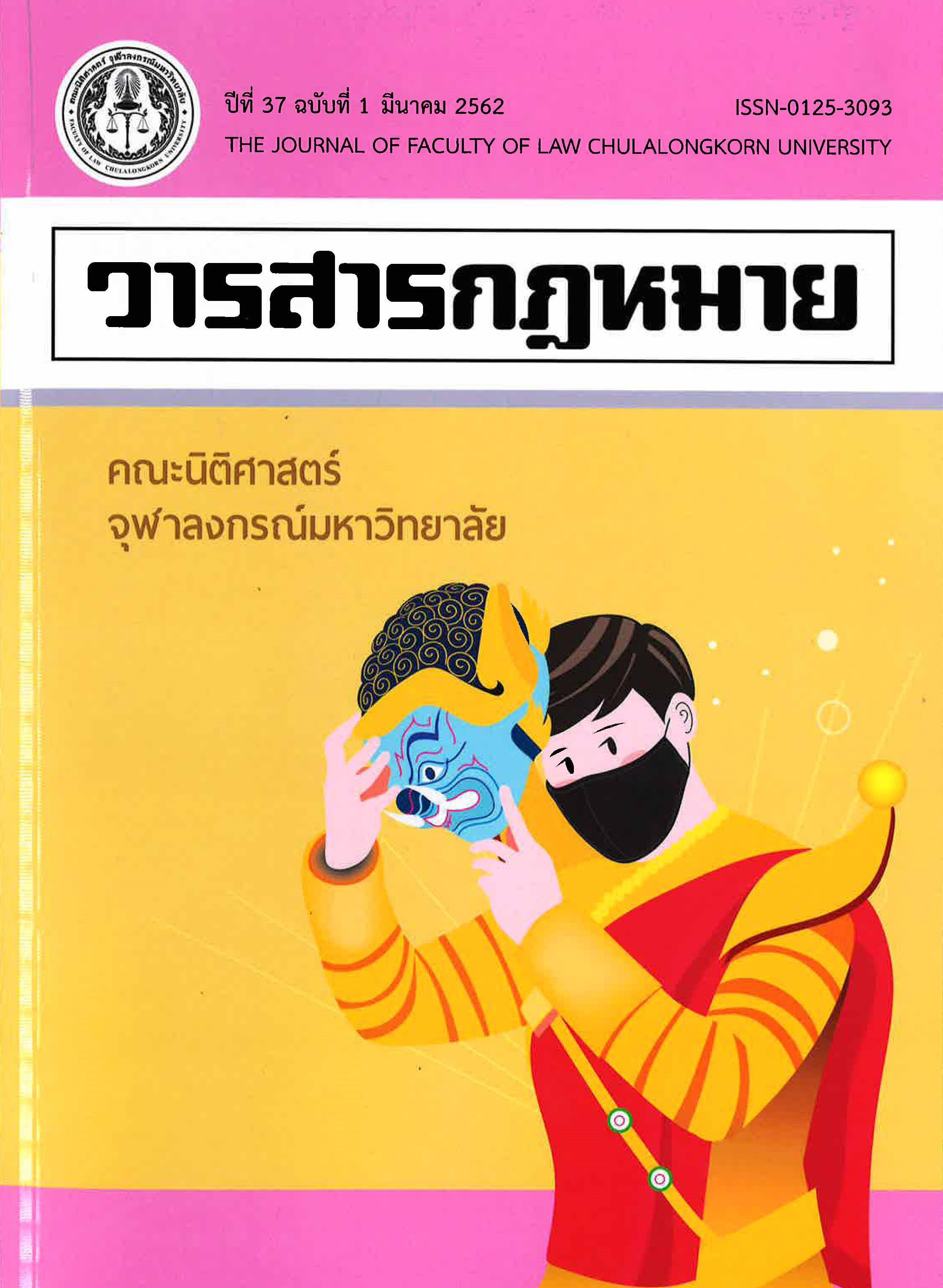มาตรการทางกฎหมายในการป้องกันและปราบปรามอาชญากรรมข้ามชาติทางด้านสิ่งแวดล้อม : กรณีศึกษาการลักลอบค้าสารทำลายชั้นโอโซน
Main Article Content
บทคัดย่อ
บทความนี้มีวัตถุประสงค์เพื่อพิจารณาถึงมาตรการทางกฎหมายในการป้องกันและปราบปรามอาชญากรรมข้ามชาติทางด้านสิ่งแวดล้อม ในกรณีการลักลอบค้าสารทำลายชั้นโอโซนอันเป็นการฝ่าฝืนต่อพิธีสารมอนทรีออลว่าด้วยสารทำลายชั้นโอโซน ค.ศ.1987 ที่กำหนดให้ประเทศภาคีมีพันธกรณีที่จะต้องควบคุมปริมาณการใช้ นำเข้าและส่งออกสารดังกล่าว แต่เนื่องจากพันธกรณีดังกล่าวได้สวนทางกับความจำเป็นในภาคอุตสาหกรรมที่ต้องใช้สารเหล่านั้น จึงได้มีการลักลอบค้าสารดังกล่าวกันเป็นจำนวนมาก ทั้งยังมีลักษณะของการกระทำความผิดแบบอาชญากรรมข้ามชาติที่เกี่ยวพันในหลายรัฐ ตั้งแต่ประเทศต้นทางหรือประเทศผู้ผลิต ประเทศทางผ่าน และประเทศปลายทาง ซึ่งประเทศไทยนั้นมีส่วนเกี่ยวข้องในฐานะเป็นประเทศปลายทางของการลักลอบค้าสารทำลายชั้นโอโซน ทั้งนี้ เนื่องจากประเทศไทยได้เข้าเป็นภาคีและให้สัตยาบันแก่พิธีสารมอนทรีออลและมีพันธกรณีที่จะต้องควบคุมปริมาณการใช้ นำเข้าและส่งออกสารดังกล่าว บทความฉบับนี้จึงได้ทำการศึกษาถึงกฎหมายที่เกี่ยวข้อง ทั้งกฎหมายของประเทศไทยและต่างประเทศเพื่อนำมาวิเคราะห์และเสนอแนะว่าควรมีแนวทางในการแก้ไขปัญหาดังกล่าวในทิศทางใด
Article Details
ลิขสิทธิ์และเนื้อหาในเว็บไซต์ของวารสารกฎหมาย (รวมถึง โดยไม่จำกัดเฉพาะ เนื้อหา รหัสคอมพิวเตอร์ งานศิลป์ ภาพถ่าย รูปภาพ ดนตรีกรรม โสตทัศนวัสดุ) เป็นกรรมสิทธิ์ของวารสารกฎหมาย และผู้ได้รับการโอนสิทธิทุกราย
1. วารสารกฎหมาย ให้อนุญาตให้คุณใช้สิทธิอันไม่เฉพาะเจาะจงที่สามารถถูกถอนเมื่อใดก็ได้ โดยไม่มีค่าใช้จ่าย ในการ
- เยี่ยมชมเว็บไซต์และเอกสารในเว็บไซต์นี้ จากคอมพิวเตอร์หรือเครื่องมือสื่อสารผ่านเว็บบราวเซอร์
- คัดลอกและจัดเก็บเว็บไซต์และเอกสารในเว็บไซต์นี้บนลงคอมพิวเตอร์ของคุณผ่านระบบความจำ cache
- สั่งพิมพ์เอกสารจากเว็บไซต์นี้สำหรับการใช้ส่วนตัวของคุณ
- ผลงานที่ได้รับการตีพิมพ์โดยวารสารกฎหมาย จุฬาลงกรณ์มหาวิทยาลัย ถูกคุ้มครองภายใต้ Creative Commons Attribution 4.0 International License ซึ่งอนุญาตให้ทุกคนสามารถคัดลอก แจกจ่าย ดัดแปลง ส่งต่อ ผลงานได้ ก็ต่อเมื่อผลงานและแหล่งข้อมูลได้รับการอ้างอิงอย่างเหมาะสม
2. วารสารกฎหมาย จุฬาลงกรณ์มหาวิทยาลัย สงวนสิทธิ์ไม่อนุญาตให้คุณใช้สิทธิอื่นใดที่เกี่ยวข้องกับเว็บไซต์และเอกสารบนเว็บไซต์นี้ เช่น การคัดลอก ดัดแปลง เปลี่ยนแปลง ส่งต่อ ตีพิมพ์ แจกจ่าย เผยแพร่ จัดแสดงในที่สาธารณะ ไม่ว่าจะในรูปแบบใดก็ตาม ซึ่งเว็บไซต์หรือเอกสารบนเว็บไซต์ โดยไม่อ้างอิงถึงแหล่งข้อมูลหรือโดยไม่ได้รับอนุญาตเป็นลายลักษณ์อักษรจากวารสารกฎหมาย จุฬาลงกรณ์มหาวิทยาลัย
3. คุณอาจขออนุญาตที่จะใช้เอกสารอันมีลิขสิทธิ์บนเว็บไซต์นี้โดยการเขียนอีเมลล์มายัง journal@law.chula.ac.th
4. วารสารกฎหมาย จุฬาลงกรณ์มหาวิทยาลัย เข้มงวดกับการคุ้มครองลิขสิทธิ์อย่างมาก หากวารสารกฎหมาย จุฬาลงกรณ์มหาวิทยาลัยพบว่าคุณได้ใช้เอกสารอันมีลิขสิทธิ์บนเว็บไซต์นี้โดยไม่ถูกต้องตามการอนุญาตให้ใช้สิทธิ ดังที่กล่าวไปข้างต้น วารสารกฎหมาย จุฬาลงกรณ์มหาวิทยาลัยอาจดำเนินคดีตามกฎหมายต่อคุณได้ เพื่อเรียกร้องค่าเสียหายที่เป็นตัวเงินและคำขอชั่วคราวให้คุณหยุดการใช้เอกสารดังกล่าว ทั้งนี้ คุณอาจถูกสั่งให้ชดใช้ค่าใช้จ่ายใดๆ ที่เกี่ยวข้องกับการดำเนินการตามกฎหมายนี้
หากคุณพบเห็นการใช้เอกสารอันมีลิขสิทธิ์ของวารสารกฎหมาย จุฬาลงกรณ์มหาวิทยาลัย ที่ขัดหรืออาจขัดต่อการอนุญาตให้ใช้สิทธิดังที่ได้กล่าวไปข้างต้น โดยเชื่อว่าได้ละเมิดลิขสิทธิ์ของคุณหรือของผู้อื่น สามารถร้องเรียนมาได้ที่ journal@law.chula.ac.th


